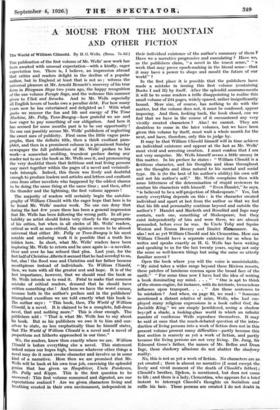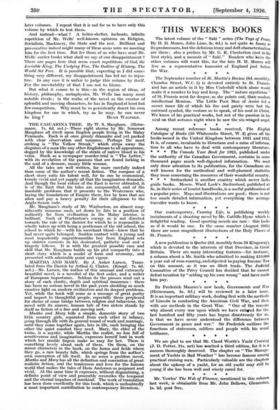A MOUSE FROM THE MOUNTAIN AND OTHER FICTION
The World of William Clissold. By H. G.Wells. (Bean. 78.6d.)
THE publication of the first volume of Mr. Wells' new work has been awaited with unusual expectation—with a kindly, eager expectation too. There is, I believe, an impression abroad that critics and readers delight in the decline of a popular author, but in England at least that is not so ; witness the universal pleasure at Mr. Arnold Bennett's recovery of his true form in Riceyman Steps two years ago, the happy recognition of the one volume Forsyte Saga, and the welcome this summer given to Ulick and Soracha. And to Mr. Wells especially all English lovers of books owe a peculiar debt. For how many years now he has entertained and delighted us ! With what gusto we recover the fun and life and energy of The Time Machine, Mr. Polly, Tono-Bungay—how grateful we are and how eager to pay something of our obligation. And here it has seemed for some months past is to be our opportunity ! No one can Possibly accuse Mr. Wells' publishers of neglecting the sweet uses of publicity. First came the little vague para- graphs, then the definite title, then a thick exultant pam- phlet, and then in a prominent column in a prominent Sunday newspaper the full publication of Mr. Wells' preface to his work—a somewhat scolding, truculent preface daring any reader not to see the book as Mr. Wells sees it, and pronouncing, the very doubtful thesis that fictitious and real living persons' may meet together within the pages of a novel and verisimili- tude triumph. Indeed, this thesis was lively and doubtful enough to produce leaders and articles and letters and exultant cries from other novelists who happened by the oddest chance to be doing the same thing at the same time ; and then, after the thunder and the lightning, the first volume appears !
The majority of readers will certainly begin the autobio- graphy of William Clissold with the eager hope that here is to be found Mr. Wells' master work. No one can deny that during the last few years there has been a general impression that Mr. Wells has been following the wrong path. In all pro- bability no artist should listen very closely to the arguments of his critics, but when in all circles of Mr. Wells' readers, critical as well as non-critical, the opinion seems to be almost universal that either Mr. Polly or Tono-Bungay is his most notable and enduring work it is possible that a truth lies hidden here. In short, what Mr. Wells' readers have been imploring Mr. Wells to return and be once again is—a novelist. Over and over he has refused that plea. Last year, for the first half of Christina Alberta it seemed that he had acceded to us, but, alas ! the flood rose and Christina and her father became mouthpieces instead of individuals. To William Clissold, then, we turn with all the greater zest and hope. It is of the first importance, however, that we should read the book as Mr. Wells intends us to read it. Fatal to make that common mistake of critical readers, demand that he should have written something else ! And here we have the worst excuse, because both in the author's preface and in the publishers' triumphant exordium we are told exactly what this book is. The author says : "This book, then, The World of William Clissold, is a novel. It is claimed to be a complete, full-dress novel, that and nothing more." This is clear enough. The publishers add : "That is what Mr. Wells has to say about his book. But as his publishers we owe it to him and our- selves to state, no less emphatically than he himself states, that The World of William Clissold is a novel and a novel of Proportions not hitherto approached in our time."
We, the readers, know then exactly where we are. William Clissold is before everything else a novel. This statement indeed raises our hopes high, because whatever other things a novel may do it must create character and involve us in some kind of a narrative. Here then we are promised that Mr. Wells will be back at his own true job, exercising the splendid genius that has given us Hoopdriver, Uncle Ponderevo, Mr. Polly and Kipps. This is the first question to be answered: This first volume consumed and digested, are our expectations realized ? Are we given characters living and breathing created in their own environment, independent in their individual existence of the author's summary of them ? Have we a narrative progressive and cumulating ? Have we, as the publishers claim, "a novel in the truest sense," "a work that may prove epoch-making in the literal sense—that it may have a power to shape and mould the future of our world" ?
In the first place it is possible that the publishers have made a mistake in issuing this first volume (containing Books I and II) by itself. After the splendid announcements it will be to some readers a trifle disappointing to realize this small volume of 244 pages, widely spaced, rather insignificantly bound. Mere size, of course, has nothing to do with the matter, but the volume does not, it must be confessed, appear imposing. And then, looking- back, the book closed, can we feel that we have in the course of it encountered any very vividly created characters ? Alas we cannot. They are doubtless to come in the later volumes, but we have been given this volume by itself, must wait a whole month for the next, and have, therefore, only this to judge by.
It may be that William Clissold himself will in time achieve an individual existence and appear at the last as Mr. Wells' most vivid and arresting creation. I must confess that I am not very sanguine. Mr. Wells himself seems a little uneasy in this matter. In his preface he states : "William Clissold is a fictitious character, and his thoughts and ideas throughout are the thoughts and ideas natural to his mental and social type. He is (to the best of his author's ability) his own self and not his author's self." Mr. Wells complains then with some bitterness of the determination of stupid reviewers to confuse his characters with himself. "Even Hamlet," he says, "is believed to be a self-projection of Shakespeare." Yes, but surely everything depends on this : is the character created individual and apart at last from the author so that we feel that his life and personality continue beyond and outside the author's ? Hamlet and Macbeth and ROsalind and Iago may contain, each one, something of Shakespeare, but they exist independently of him and were there, we are almost persuaded, before ever he was. So Uncle Toby and Squire Weston and Emma Bovary and Dmitri Waramazov. So, alas ! not as yet William Clissold and his Clementina. How can William Clissold have a separate existence for us when he writes and speaks exactly as H. G. Wells has been writing and speaking to us for the last twenty years, saying not only the same so well-known things but using the same so utterly familiar accent ?
Open the book where you will the voice is unmistakable. "My mind takes a.whler range beyond _these Riviera resorts, these patches of luminous eczema upon the broad face of the earth." "For some time now I have had the idea of writing
a book dominating my mind. . . . "One is apt to think of the steam-engine, for instance, with its intricate, tremendous influence upon transport. . . . " Are these sentences to be mistaken ? And when, on page 92, we read : "Someone mentioned a distant relative of mine, Wells, who had em- ployed many religious expressions in a book called God, the Invisible King," we are simply bewildered, seeing a shadow beyentl a shade, a looking-glass world in which an infinite number of vociferous Wells reproduce themselves. It may be said at once that the much-debated question of the intro- duction of living persons into a work of fiction does not in this present volume present many difficulties—partly because this first section is scarcely as yet a work of fiction, and partly because the living persons are not very living. Dr. Jung, Sir Edmund Gosse's father, the names of Mr. Belloc and Dean Inge, these shadowy allusions do not shatter the shadowy reality.
No, this is not as yet a work of fiction. No characters are as yet created ; there is almost no narrative (I must except the lively and vivid moment of the death of Clissold's father) ; Clissold's brother, INckon, is mentioned, but does not come to life ; and there is a lady, Clementina, who appears for a brief instant to interrupt Clissold's thoughts on Socialism and ruffle his hair. These persons are created I do not doubt hi later volumes. I repeat that it is sad for us to have only this volume by which to test them.
And instead—what ? A helter-skelter, inchoate, infinite repetition of Mr. Wells' well-known opinions on Religion, Socialism, Machinery, the State and the rest. Brilliant _and provocative indeed might many of these seem were we meeting him for the first time. But for those of us who have read Mr. Wells' earlier books what shall we say of our disappointment ? There are pages here that seem exact repetitions of God, the invisible King, The Undying Fire, The Outline of History, The World Set Free. It is possible that, expecting as I did some- thing very different, my disappointment has led me to injus- tice. In any case it is unfair to judge this volume by itself. For the inevitability of that I am not to blame.
But what it comes to is this—in the region of ideas, of history, philosophy, metaphysics, Mr. Wells has many most notable rivals ; in the realm of the novel as the creator of splendid and moving characters, he has in England at least but few competitors. Why must he so persistently desert his own kingdom for one in which, try as he may, he can never



































 Previous page
Previous page